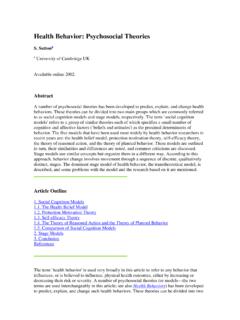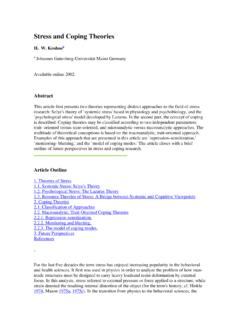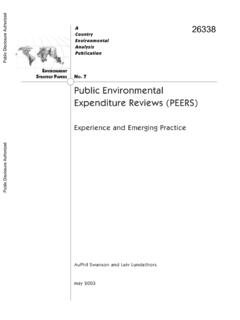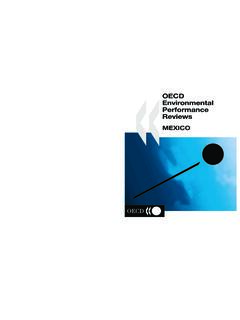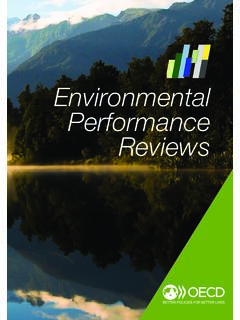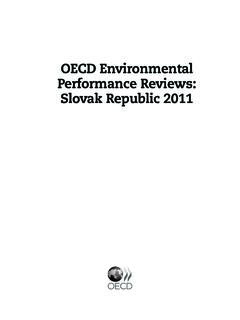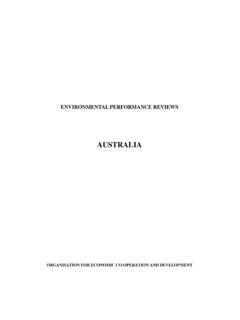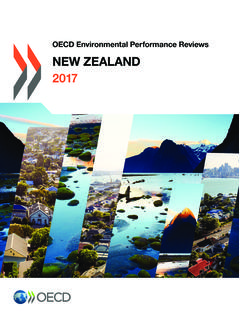Transcription of Environmental Policy Integration through the OECD Peer ...
1 Environmental Policy Integration through the OECD Peer Reviews: Integrating Economy to the Environment or Environment to the Economy? Paper presented at the IHDC conference, 3-4 December 2004, Berlin Markku Lehtonen Centre d Economie et d Ethique pour l Environnement et le D veloppement (C3ED), Universit de Versailles Saint-Quentin-en-Yvelines France Home address: 60, rue de la Colonie 75013 Paris tel: +33 (0)6-65 40 43 58 e-mail: Abstract As an intergovernmental organisation lacking coercive powers, the OECD can promote Policy Integration through what have been called idea-games , relying on moral persuasion, and processes such as socialisation and imitation.
2 This paper compares the impacts on Environmental Policy Integration from two OECD peer review processes: the Environmental performance Reviews (EPRs), carried out since 1992, and the Economic Surveys, the flagship of the OECD since the establishment of the organisation in 1961. The EPRs enhance Environmental Policy Integration mainly by increasing the visibility and legitimacy of Environmental issues in the non- Environmental sectors. This impact stems both from the review process and from the use of the report and its recommendations.
3 However, the scant interest that the reviews generate and by the low status of the Environmental Policy community in Policy making greatly reduce the potential of the EPRs to influence policies. The inclusion of a sustainable development section in the prestigious Economic Surveys hence carries a greater potential to enhance Policy Integration . Yet, the very limited scope of the sustainable development analysis, the lack of expertise among the economic experts participating in the debates around the Economic Surveys, and the lack of enthusiasm of the economic Policy community for addressing the questions of sustainable development compromise the Surveys potential to promote Environmental Policy Integration .
4 Given the highly unequal distribution of power between the two Policy communities, genuine Environmental Policy Integration and well-informed decision-making might be better served by clearly separating Environmental and economic issues at the analytical, peer review level, so as to protect the independence and integrity of the Environmental Policy community. 2 Table of contents: 1. Introduction: OECD s role in promoting Environmental Policy Integration 2. Environmental Policy Integration in theory: what is meant by the term?
5 3. Environmental Policy Integration in practice: OECD peer reviews 4. The OECD Environmental performance review (EPR) Programme 5. EPRs and Environmental Policy Integration Impacts from the EPR process Impacts from the review report and its recommendations 6. Integrating environment/sustainable development concerns into OECD Economic Surveys Theoretical framework applied in the Economic Surveys review methodology and Environmental Policy Integration review process and Environmental Policy Integration review reports and Environmental Policy Integration 7.
6 Discussion: Integration on whose conditions? References 31. Introduction: OECD s role in promoting Environmental Policy Integration The OECD is typically an organisation that relies on norm creation and idea games as means of exercising its power, as it can exert neither regulatory nor financial pressure to influence the behaviour of national actors (Finnemore and Sikkink 1998; Marcussen 2001). The most important characteristic of the OECD work is that no decisions are made the OECD committees are not mainly engaged in preparing decisions for the OECD Council (Marcussen 2001).
7 Its power is therefore based essentially on moral persuasion and peer pressure. Julin (2003) has described the OECD as simultaneously fulfilling the roles of a think-tank, a databank, a problem-solver, a pathfinder, a Policy adviser, a forum and meeting place, and sometimes a deal broker. The so-called peer reviews of OECD countries policies in different sectors have been characterised as the flagship of the organisation s activities, a key instrument used by the OECD in playing its various roles and promoting its Policy agenda (OECD 2003a).
8 The OECD has defined the Integration of policies, both vertically (international, national, and sub-national levels) as well as horizontally (within and across sectors) as one of the major challenges of sustainable development ( OECD 2001a, 47-56). Special emphasis has been given to Policy Integration in agriculture, transport and energy sectors, given the particularly significant economic, social and Environmental impacts caused by activities in these sectors. Policy Integration has in the OECD been mainly promoted by actors in the field of the environment, where the lack of Integration of Environmental concerns into sectoral policymaking has been a key concern at least since 1970s, and, was later on identified as an obstacle to sustainable For the OECD, as an organisation whose mandate is to promote economic cooperation and development.
9 It is natural to stress the economy-environment interface as the key area of Integration (see OECD 1996). The main objective of such Integration should be the decoupling of Environmental pressures from economic growth, established as one of the key objectives on the way towards sustainable development (OECD 2001a, 13-16) and one of the five objectives of the OECD Environmental Strategy for the First Decade of the 21st Century (OECD 2001b). The importance accorded to Integration is likewise reflected in the development of indicators, notably those on sectoral Integration , decoupling (OECD 2002a), and accounting (OECD 2004a).
10 Finally, the choice of Policy Integration as one of the three themes to be discussed by the OECD Environment Ministerial meeting in April 2004 (OECD 2004b, 23-24) testifies to the continued importance given to this objective within the OECD. Against this background, it is hardly surprising that Policy Integration constitutes one of the three main areas of analysis in the OECD Environmental performance Reviews (EPRs). However, in line with the horizontal nature of its activities, the OECD has adopted an approach where sustainable development issues should be integrated to all activities of the organisation, and therefore also to all OECD peer reviews.
